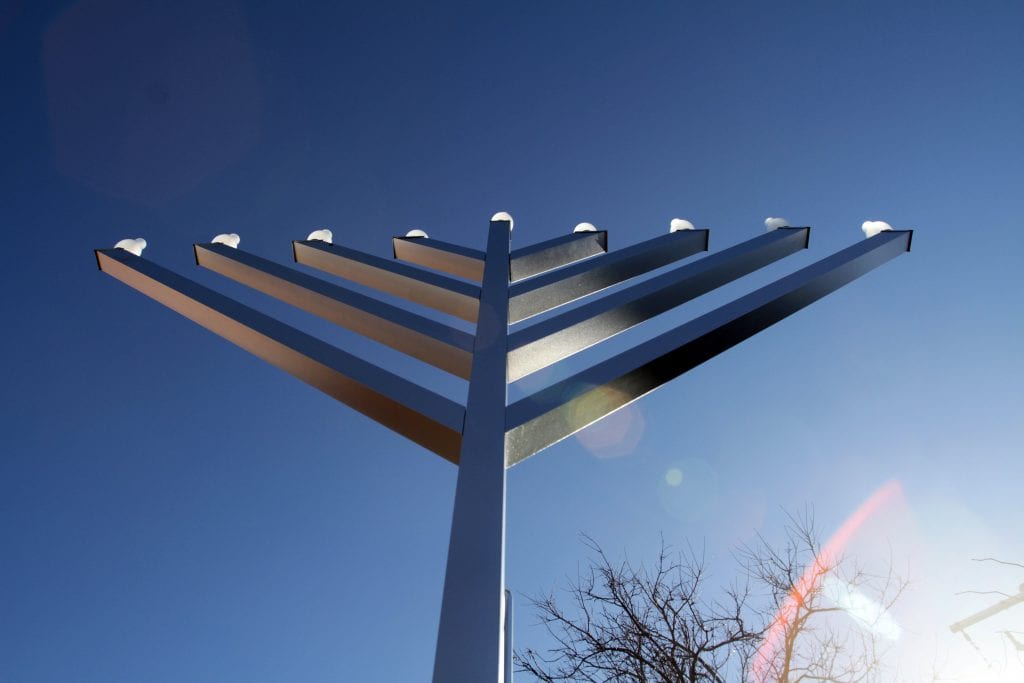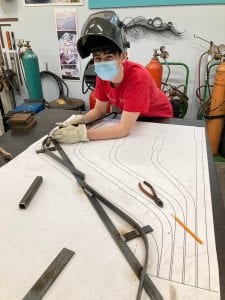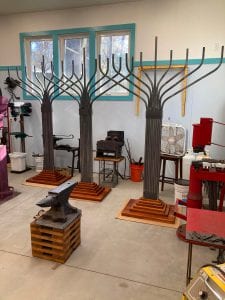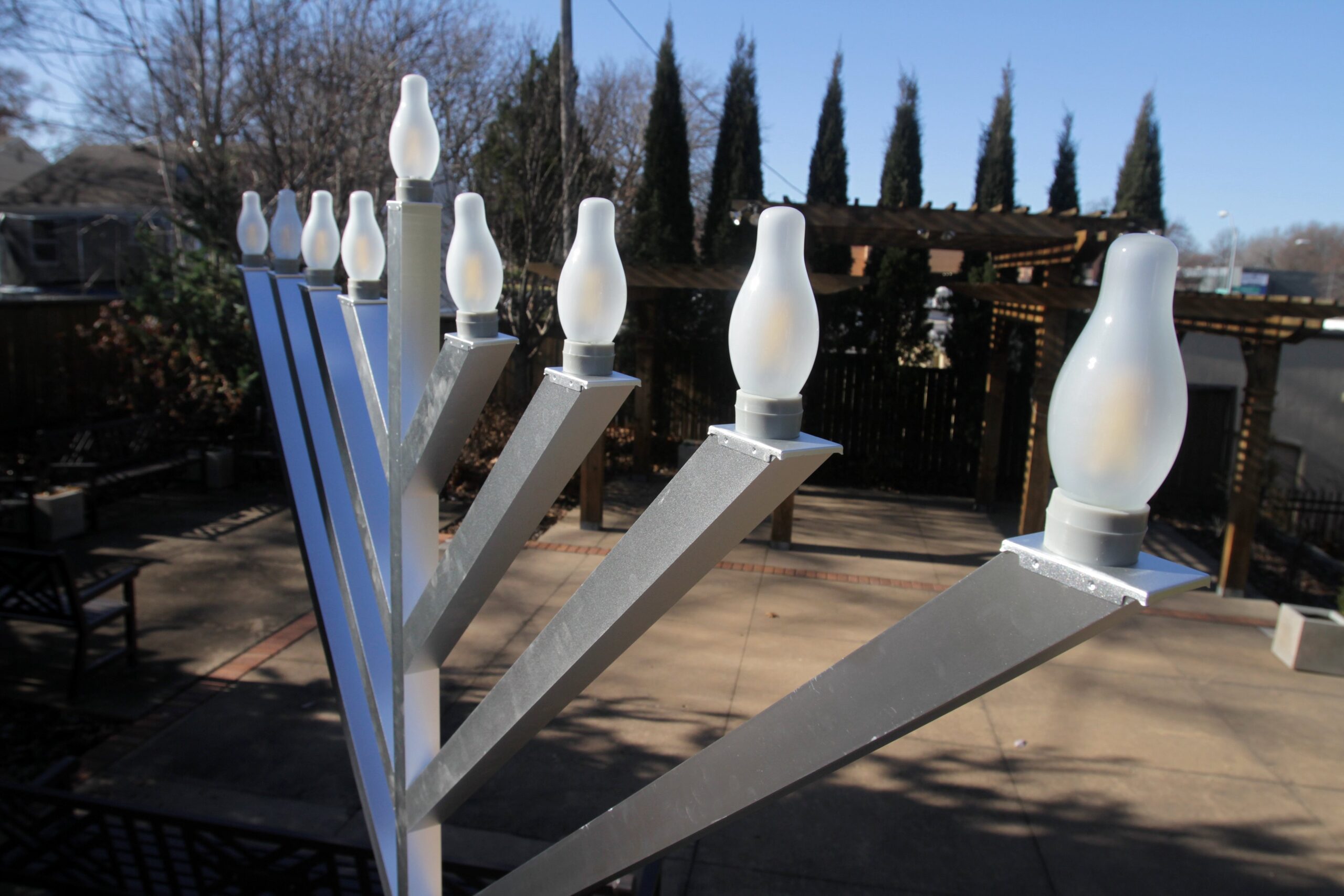This article was first published by Religion News Service on Dec. 9, 2020.
(RNS) — Jewish tradition teaches that the story of the Hanukkah miracle of light over darkness should be publicized.
You may unsubscribe from any of our newsletters at any time.
It’s the reason some Jews put a menorah (sometimes called a “hanukkiah”) in the window or by the door. Lighting the nine-branched candelabrum is the central ritual of the eight-day holiday, which began Thursday (Dec. 10).
But for the most part, American Jews have kept the December holiday an indoor celebration among family and friends. Unlike the High Holy Days of Rosh Hashana and Yom Kippur when Jews crowd synagogues en masse, Hanukkah has always been a home-centered celebration — typically enjoyed with lots of fried foods, like potato latkes and jelly doughnuts.
Not this year.
With synagogues shuttered because of the coronavirus and Zoom fatigue settling in, Jews across the country are building public menorahs and, in some places, hosting public, outdoor lighting ceremonies to mark the holiday.
“The idea of publicizing the miracle has always been important to us, but we’ve never really done it,” said Rabbi Alan David Londy of the New Reform Temple in Kansas City, Mo.

This year, Londy’s synagogue mounted a nine-foot electric menorah on its grounds. It plans to hold outdoor ritual lighting ceremonies at dusk every evening and is inviting people to watch from their cars and listen to the service, which will be broadcast on the radio.
More on Broadview:
- Jewish TV dramas like ‘Unorthodox’ hit close to home for me
- The Canadian Jewish News to shut down
- Amid COVID-19, shofar lessons become pre-Rosh Hashanah necessity
Likewise, Temple Emanu-El in Oak Park, Michigan, plans to lead several short lighting ceremonies on its grounds at sunset. The Reform synagogue had an oil-based tiki-torch menorah built and is allowing small groups of people to gather outdoors in person — masked and socially distanced.
In California, the Silicon Valley Jewish community will hoist a six-foot-by-six-foot electric menorah in an outdoor shopping center in the city of Campbell. (The state is under strict stay-at-home orders so there will be no public ritual.)
Large public menorahs are not entirely new. The Hasidic movement, Chabad, has for years held public menorah lighting ceremonies on city streets, parks and public plazas. This year it is planning to erect 15,000 nine-foot menorahs across the world and is also adding 6,500 menorah-topped cars. (A Chicago-based Chabad is hosting its first-ever Menorah Car Parade.) But those have mostly involved Orthodox communities, which make up a minority of American Jews.
Not that American Jews are giving up on online venues. IllumiNation, an event planned for Thursday (Dec. 10), will have Jewish leaders from the Conservative movement lighting the first Hanukkah candle online from all 50 states.
Hanukkah celebrates an ancient military victory in which a band of Jewish rebels rose up against their Greek-Syrian oppressors who had defiled the Jerusalem Temple with Greek gods. Led by Judah Maccabee and his brothers, the rebels drove the Hellenizers from the Temple and reestablished Jewish sovereignty over it. The rededication of the Temple included the lighting of the candelabra with a small flask of consecrated oil that miraculously lasted for eight days.

Many American Jews find meaning in the holiday’s theme of their faith’s triumph over assimilation to a foreign culture.
“To me, the story of Hanukkah is the story of two worldviews,” said Londy. “The Hellenistic worldview was fatalistic. The Jewish view of the world is hope. When we light the hanukkiah this year, it’s a statement of hope.”
One reason Jews across the centuries may have shied from overtly public menorah displays is a sense of vulnerability, if not an outright fear of persecution. But with the pandemic raging across the country and synagogues shuttered for nearly 10 months this year, many felt a need for some kind of public gathering.
“We’re all reimagining Jewish life for the time of the pandemic,” said Rabbi Daniel Greyber of Beth El Synagogue in Durham, North Carolina (where, full disclosure, I attend.) “We need to be safe. We need to be outdoors. What do we do? How do we hold the community together?”

Beth El Synagogue had a metal worker, assisted by the congregation’s teens, forge three nine-foot by six-foot oil-lit menorahs, which will be installed in three locations (two in Durham and one in Chapel Hill). The congregation will hold short outdoor lighting services — with masks, social distancing and a 25-person capacity at each event.
“The ability to go into public spaces and to say, ‘We can proudly celebrate our Judaism in the public space’ is a marker of the extent to which Jews feel a sense of at-homeness and acceptance in America,” Greyber said. “I can totally see us doing it in future years. Hopefully we’ll be able to invite the whole community.”













